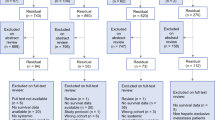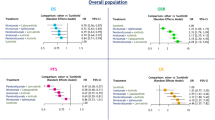Abstract
Background
Radiotherapy (RT) may function synergistically with immunotherapy and targeted agents (TA). This study aimed to assess the effectiveness and safety of RT combined with programmed death-1 (PD-1) inhibitors and lenvatinib in patients with relapsed or refractory advanced biliary tract carcinoma (BTC).
Methods
This retrospective study included patients with relapsed or refractory advanced BTC who received RT combined with PD-1 inhibitors and lenvatinib at the Peking Union Medical College Hospital (PUMCH). Overall survival (OS), progression-free survival (PFS), objective response rate (ORR), disease control rate (DCR), and safety were evaluated.
Results
Thirty-one patients who received RT combined with PD-1 inhibitors and lenvatinib as a second- or later-line therapy were analyzed. RT sites were mainly distributed in the liver lesions (64.5%) and lymph nodes (58.1%). The ORR and DCR were 32.3% (10/31; 95% CI: 14.8–49.7) and 87.1% (27/31; 95% CI: 74.6–99.6), respectively. The median PFS (mPFS) and median OS (mOS) were 7.9 (95% CI: 7.1–8.7) and 11.7 (95% CI: 8.3–15.0) months, respectively. Subgroup analyses of this cohort included 12 and 19 patients who received concurrent and salvage (> 6 weeks after commencing PD-1 inhibitor therapy) RT, respectively. The salvage RT group had higher mOS (11.7 vs. 10.5; p = 0.75) and mPFS (7.9 vs. 6.9; p = 0.85) than the concurrent RT group; however, statistical significance was not reached. All patients experienced any-grade adverse events (AEs), and excessive PD-1 inhibitors or RT toxicity were not observed.
Conclusions
RT, PD-1 inhibitors, and lenvatinib may be safely combined and have antitumor effectiveness in patients with advanced BTC.



Similar content being viewed by others
Data availability
All data generated or analyzed during this study are included in this published article and its supplementary information files.
Abbreviations
- AEs:
-
Adverse events
- BTCs:
-
Biliary tract cancers
- CR:
-
Complete response
- CTCAE:
-
Common Terminology Criteria Coastocellular Group
- DCR:
-
Disease control rate
- ECC:
-
Extrahepatic cholangiocarcinoma
- GBC:
-
Gallbladder cancer
- HR:
-
Hazard rate
- ICC:
-
Intrahepatic cholangiocarcinoma
- Lenvatinib:
-
Tyrosine kinase inhibitors
- ORR:
-
Objective response rate
- OS:
-
Overall survival
- PD:
-
Progressive disease
- PD-1:
-
Programmed cell death protein 1
- PD-L1:
-
Programmed cell death ligand 1
- PFS:
-
Progression-free survival
- PR:
-
Partial response
- RECIST:
-
Response evaluation criteria in solid tumors
- RT:
-
Radiotherapy
- SD:
-
Stable disease
- TA:
-
Targeted agents
References
Brindley PJ, Bachini M, Ilyas SI, Khan SA, Loukas A, Sirica AE, Teh BT, Wongkham S, Gores GJ (2021) Cholangiocarcinoma. Nat Rev Dis Prim 7:65. https://doi.org/10.1038/s41572-021-00300-2
Valle JW, Borbath I, Khan SA, Huguet F, Gruenberger T, Arnold D (2016) Biliary cancer: ESMO clinical practice guidelines for diagnosis, treatment and follow-up. Ann Oncol Official J European Soc Med Oncol 27:v28–v37. https://doi.org/10.1093/annonc/mdw324
Valle JW, Kelley RK, Nervi B, Oh DY, Zhu AX (2021) Biliary tract cancer. Lancet (London, England) 397:428–444. https://doi.org/10.1016/s0140-6736(21)00153-7
Boilève A, Hilmi M, Delaye M, Tijeras-Raballand A, Neuzillet C (2021) Biomarkers in hepatobiliary cancers: What is useful in clinical practice? Cancers. https://doi.org/10.3390/cancers13112708
Shroff RT, Kennedy EB, Bachini M et al (2019) Adjuvant therapy for resected biliary tract cancer: ASCO clinical practice guideline. J clin oncol offi j Am Soc Clin Oncol 37:1015–1027. https://doi.org/10.1200/jco.18.02178
Valle J, Wasan H, Palmer DH et al (2010) Cisplatin plus gemcitabine versus gemcitabine for biliary tract cancer. N Engl J Med 362:1273–1281. https://doi.org/10.1056/NEJMoa0908721
Lamarca A, Palmer DH, Wasan HS et al (2021) Second-line FOLFOX chemotherapy versus active symptom control for advanced biliary tract cancer (ABC-06): a phase 3, open-label, randomised, controlled trial. Lancet Oncol 22:690–701. https://doi.org/10.1016/s1470-2045(21)00027-9
Wang Y, Yang X, Wang D et al (2022) lenvatinib beyond first-line therapy in patients with advanced biliary tract carcinoma. Front Oncol 12:785535. https://doi.org/10.3389/fonc.2022.785535
Piha-Paul SA, Oh DY, Ueno M et al (2020) Efficacy and safety of pembrolizumab for the treatment of advanced biliary cancer: results from the KEYNOTE-158 and KEYNOTE-028 studies. Int J Cancer 147:2190–2198. https://doi.org/10.1002/ijc.33013
Villanueva L, Lwin Z, Chung HCC, Gomez-Roca CA, Graham DMJ (2021) Lenvatinib plus pembrolizumab for patients with previously treated biliary tract cancers in the multicohort phase 2 LEAP-005 study. J Clin Oncol 39:4080
Taggar AS, Mann P, Folkert MR, Aliakbari S, Myrehaug SD, Dawson LA (2021) A systematic review of intraluminal high dose rate brachytherapy in the management of malignant biliary tract obstruction and cholangiocarcinoma. Radiother Oncol J European Soc Ther Radiol Oncol 165:60–74. https://doi.org/10.1016/j.radonc.2021.10.011
Liu Y, Dong Y, Kong L, Shi F, Zhu H, Yu J (2018) Abscopal effect of radiotherapy combined with immune checkpoint inhibitors. J Hematol Oncol 11:104. https://doi.org/10.1186/s13045-018-0647-8
Liniker E, Menzies AM, Kong BY et al (2016) Activity and safety of radiotherapy with anti-PD-1 drug therapy in patients with metastatic melanoma. Oncoimmunology. 5:e1214788. https://doi.org/10.1080/2162402x.2016.1214788
Lin J, Yang X, Long J et al (2020) Pembrolizumab combined with lenvatinib as non-first-line therapy in patients with refractory biliary tract carcinoma. Hepatobiliary Surg Nutr 9:414–424. https://doi.org/10.21037/hbsn-20-338
Jian Z, Fan J, Shi GM et al (2021) Lenvatinib plus toripalimab as first-line treatment for advanced intrahepatic cholangiocarcinoma: a single-arm, phase 2 trial. J Clin Oncol 39:4099
Mody K, Starr J, Saul M, Poorman K, Shields AF (2019) Patterns and genomic correlates of PD-L1 expression in patients with biliary tract cancers. J Gastrointest Oncol 10:1099–1109
Lan Y, Moustafa M, Knoll M et al (2021) Simultaneous targeting of TGF-β/PD-L1 synergizes with radiotherapy by reprogramming the tumor microenvironment to overcome immune evasion. Cancer Cell 39:1388–403.e10. https://doi.org/10.1016/j.ccell.2021.08.008
Mondini M, Levy A, Meziani L, Milliat F, Deutsch E (2020) Radiotherapy-immunotherapy combinations: perspectives and challenges. Mol Oncol 14:1529–1537. https://doi.org/10.1002/1878-0261.12658
Zuo B, Yang X, Yang X et al (2022) A real-world study of the efficacy and safety of anti-PD-1 antibodies plus lenvatinib in patients with advanced gallbladder cancer. Cancer immunol immunother CII. https://doi.org/10.1007/s00262-021-03121-0
Chicas-Sett R, Morales-Orue I, Rodriguez-Abreu D, Lara-Jimenez P (2018) Combining radiotherapy and ipilimumab induces clinically relevant radiation-induced abscopal effects in metastatic melanoma patients: a systematic review. Clin transl radiat oncol 9:5–11. https://doi.org/10.1016/j.ctro.2017.12.004
Salama AK, Postow MA, Salama JK (2016) Irradiation and immunotherapy: from concept to the clinic. Cancer 122:1659–1671. https://doi.org/10.1002/cncr.29889
Patel RB, Hernandez R, Carlson P et al (2021) Low-dose targeted radionuclide therapy renders immunologically cold tumors responsive to immune checkpoint blockade. Sci transl med. https://doi.org/10.1126/scitranslmed.abb3631
Dovedi SJ, Adlard AL, Lipowska-Bhalla G et al (2014) Acquired resistance to fractionated radiotherapy can be overcome by concurrent PD-L1 blockade. Can Res 74:5458–5468. https://doi.org/10.1158/0008-5472.Can-14-1258
Funding
This work was supported by CAMS Innovation Fund for Medical Sciences (CIFMS) (2021–1-I2M-003 and 2021-I2M-1–061), CSCO-hengrui Cancer Research Fund (Y-HR2019-0239, Y-HR2020MS-0415, Y-HR2020QN-0414), CSCO-MSD Cancer Research Fund (Y-MSDZD2021-0213) and National Ten-thousand Talent Program.
Author information
Authors and Affiliations
Contributions
YCW and XBY collected the data and wrote the manuscript. XRH and HTZ designed and examined the study. NZ, JYL, and XY helped to collect the literature and participated in discussions. ZYX, JNX, and YYW performed the statistical analyses. All authors read and approved the final manuscript.
Corresponding authors
Ethics declarations
Conflict of Interest
The authors have no conflicts of interest to declare.
Ethical approval
All patients were fully informed about the objectives of this study and provided formal written consent a priori. The protocols of this study were compliant with the principles of the Declaration of Helsinki and were also approved by the institutional review board and ethics committee at Peking Union Medical College Hospital (PUMCH-JS-1391).
Additional information
Publisher's Note
Springer Nature remains neutral with regard to jurisdictional claims in published maps and institutional affiliations.
Supplementary Information
Below is the link to the electronic supplementary material.
Rights and permissions
Springer Nature or its licensor (e.g. a society or other partner) holds exclusive rights to this article under a publishing agreement with the author(s) or other rightsholder(s); author self-archiving of the accepted manuscript version of this article is solely governed by the terms of such publishing agreement and applicable law.
About this article
Cite this article
Wang, Y., Yang, X., Wang, Y. et al. Effectiveness and safety of radiotherapy plus programmed death-1 inhibitors and lenvatinib in patients with advanced biliary tract carcinoma: a real-world study. Cancer Immunol Immunother 72, 2197–2204 (2023). https://doi.org/10.1007/s00262-023-03399-2
Received:
Accepted:
Published:
Issue Date:
DOI: https://doi.org/10.1007/s00262-023-03399-2




